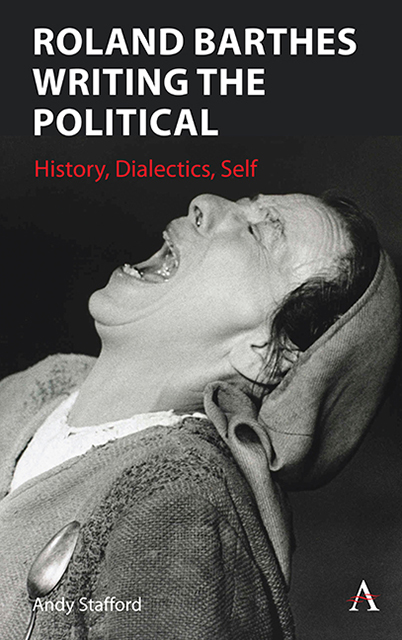Book contents
- Frontmatter
- Contents
- Acknowledgements
- Foreword
- Chapter One ‘The Dialectical Logic of Love’
- Chapter Two ‘Amorous Dialectic’
- Chapter Three ‘The People Chorus’
- Chapter Four ‘Double Grasp’
- Chapter Five ‘Stereographic Space’
- Chapter Six ‘Non-Classifiable’
- Chapter Seven ‘New Dialectic’
- Chapter Eight ‘Opacity’
- Chapter Nine ‘Undialectics’
- Afterword: Essayism and the Politics of Writing
- Bibliography
- Index
Chapter Six - ‘Non-Classifiable’
Published online by Cambridge University Press: 08 June 2023
- Frontmatter
- Contents
- Acknowledgements
- Foreword
- Chapter One ‘The Dialectical Logic of Love’
- Chapter Two ‘Amorous Dialectic’
- Chapter Three ‘The People Chorus’
- Chapter Four ‘Double Grasp’
- Chapter Five ‘Stereographic Space’
- Chapter Six ‘Non-Classifiable’
- Chapter Seven ‘New Dialectic’
- Chapter Eight ‘Opacity’
- Chapter Nine ‘Undialectics’
- Afterword: Essayism and the Politics of Writing
- Bibliography
- Index
Summary
‘History Cannot March Against History’
Barthes's speech in Bucharest in September 1949 finishes with these words. Not only does the tone resemble the ‘messianism’ in Walter Benjamin's theories on history we considered in Chapter Three, it suggests a voluntarist take on historical change. Furthermore, given that his initiation into the Marxism of his sanatorium friend Georges Fournié in 1946 occurs only one year before he becomes a French Lecturer in Bucharest, it is important to consider the young intellectual's attitude towards Stalinism during this pivotal period in world Communism which we will do in Chapter Seven. Before this we need to lay the basis for an analysis of the dialectical form of thinking that Barthes develops following this extraordinary injunction on history in Bucharest. To do this we will consider in Chapter Six his writings on Japan and China. But first, in this chapter we will consider, in the light of the ‘loss’ of self that we saw in Chapter Four, how Barthes deals with these two forms of determinism, the systematic and the classifying.
The System that is suppleness is not entirely original in Mythologies. Baudelaire's naiveté in his 1855 view that art criticism should be ‘free of a system’ (cited in Shawcross 1997, 51–52) is mirrored in Barthes's critique of the systematic that, as we shall see, is not at all systematic. Nevertheless, Barthes is certainly tempted by some form of system, especially in relation to History. For Michelet, Voltaire ‘dissipated history like dust in the wind, by consigning it to blind chance’ (1962, 244), and – despite his two-part history of the reign of Louis XIV – failed to understand history. As we shall see, the Barthes of the 1950s takes this blind chance view of Voltaire's and subjects it to a penetrating critique in 1958 precisely for its lack of system.
However, in his 1971 essay on Fourier (1989, 109), Barthes uses a quotation from Marx/Engels's The German Ideology (1974) to underline the paradoxes of systems whereby orthodox followers of system end up as the ‘exact antipodes’ of that system (hence Marx's famous dictum: ‘I am not a Marxist’); and makes an important distinction.
- Type
- Chapter
- Information
- Roland Barthes Writing the PoliticalHistory, Dialectics, Self, pp. 125 - 144Publisher: Anthem PressPrint publication year: 2022



